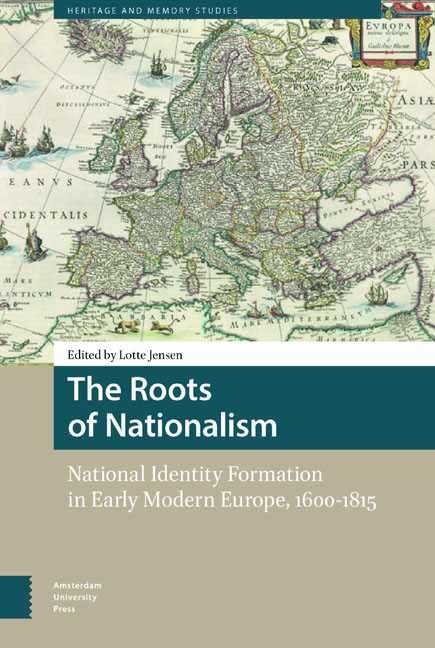Book contents
- Frontmatter
- Contents
- The Roots of Nationalism: Introduction
- Part One The Modernist Paradigm Contested
- Part Two The Genealogy of National Identity
- Part Three Negative Mirror Imaging
- Part Four Maps, Language and Canonisation
- Part Five Nation in the Age of Revolution
- List of Illustrations
- List of Contributors
- Index
The Roots of Nationalism: Introduction
Published online by Cambridge University Press: 03 February 2021
- Frontmatter
- Contents
- The Roots of Nationalism: Introduction
- Part One The Modernist Paradigm Contested
- Part Two The Genealogy of National Identity
- Part Three Negative Mirror Imaging
- Part Four Maps, Language and Canonisation
- Part Five Nation in the Age of Revolution
- List of Illustrations
- List of Contributors
- Index
Summary
We may often remark a wonderful mixture of manners and characters in the same nation, speaking the same language, and subject to the same government … Where the government of a nation is altogether republican, it is apt to beget a peculiar set of manners. Where it is altogether monarchical it is more apt to have the same effect; the imitation of superiors spreading the national manners faster among the people. If the governing part of state consist altogether of merchants, as in Holland, their uniform way of life will fix their character. If it consists chiefly of nobles and landed gentry, like Germany, France, and Spain, the same effect follows. The genius of a particular sect or religion is also apt to mould the manner of a people.
In 1748, the Scottish philosopher David Hume made a clear statement about the origins of national character in his collection of moral and political essays. He argued that the character of a nation depended solely upon socio-political and moral factors. His essay ‘Of National Characters’ was a fierce attack on the widely held climate theory that attributed the differences between peoples to the influence of the climatological circumstances in which they lived. According to this theory, southern peoples like the Spanish and the Italians were wittier and more inclined to warfare than northern peoples whose mental state was determined by greater humidity. Hume objected to this theory by giving nine examples where it failed. One of his decisive arguments was that even though Spanish, English, French and Dutch people travelled across the entire globe, they were still distinguishable. Instead, Hume foregrounded other elements which defined national character, such as cultural habits, a shared language, a common religion and being subject to the same government.
Hume's essay is part of a long tradition of texts about national stereotypes and character that can be traced back to the Middle Ages. The way he reflects upon ‘nation’ and ‘national character’ reveals that these terms had become ingrained in common speech, but were historically charged and contested. Hume refuted the idea that differences in the manners and customs of people could be related to climatological factors and promoted the idea of differences in ‘national cultures’, in other words: the idea that national identity was primarily defined along cultural lines.
- Type
- Chapter
- Information
- The Roots of NationalismNational Identity Formation in Early Modern Europe, 1600–1815, pp. 9 - 28Publisher: Amsterdam University PressPrint publication year: 2016
- 1
- Cited by



